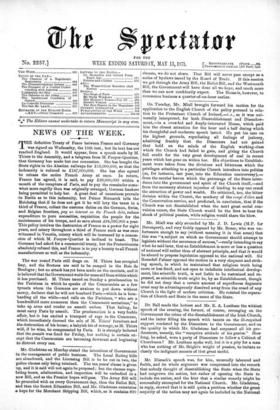Mr. Mall was ably seconded by Mr. J. D. Lewis
(M.P. for Devonport), and very feebly opposed by Mr. Bruce, who was un- fortunate enough to say (without meaning it in that sense) that this was "a subject on which no Government should attempt to legislate without the assurance of success,"—really intending to say what he said later, that an Establishment is more or less a question of national will rather than of abstract principle, and that it would be absurd to propose legislation opposed to the national will. Sir Roundell Palmer opposed the motion in a very eloquent and strik- ing speech, in which he maintained that religious truth being more or leas fixed, and not open to indefinite intellectual develop- ment, like scientific truth, is not liable to be restrained and re- pressed, as scientific truth might be, by an Establishment, though he did not deny that a certain amount of superfluous dogmatic crust may be advantageously dissolved away from the creed of any Church in the light of modern criticism. He resisted the separa- tion of Church and State in the name of the State.


































